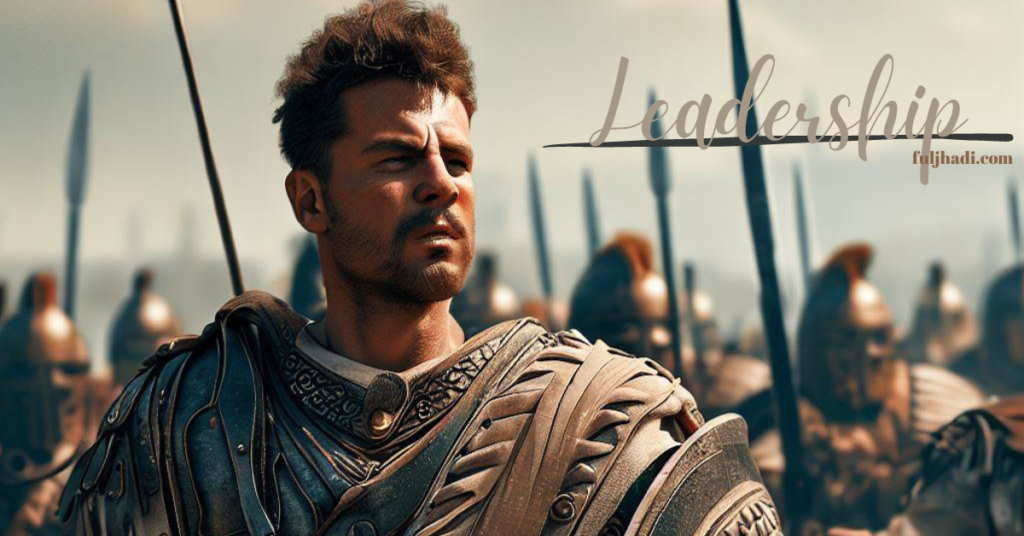Alexander the Great, a name inscribed on the stones of history, is a brilliant example of exceptional leadership skills. Leadership is one of the most sought-after skills in modern times. Exploring Alexander’s leadership skills offers relevant insights even today. Undoubtedly, Alexander’s conquests and achievements have left a lasting mark on the world. To appreciate Alexander’s leadership skills, we must first understand his life and upbringing.

Upbringing and early life
Alexander III, commonly known as Alexander the Great, was the king of the ancient Greek kingdom of Macedonia. Alexander the Great was born in 356 BC to King Philip II and Queen Olympias. During his teenage, renowned philosopher Aristotle taught him medicine, philosophy, morals, religion, logic, and art. His education under Aristotle was a significant factor in defining his leadership and conquests.
After the death of King Philip II, Alexander succeeded to the throne without opposition. He ruled from 336 BC to 323 BC for 13 years and extended his empire from Greece to Northwestern India at the age of 30. Significant advancements in Science, Arts, Philosophy, and Cultural exchanges happened during his reign. Alexander’s leadership skills not only expanded his empire but also had impacts that are still evident.
Why are leadership skills necessary?
Leadership skills are necessary for several reasons. Leaders can provide clear vision and direction to their team. Influential leaders can inspire and motivate their teams to achieve their objectives. Above all, good leaders can build strong teams, foster positive environments, and make mindful decisions. Let’s have a look at some of Alexander’s leadership skills.
Vision and Ambition
Central to Alexander’s leadership was his grand vision of a unified empire. His ambitious goals inspired his troops and also served as a testament to the power of setting far-reaching objectives. Unlike many other conquerors, instead of imposing Greek culture, Alexander encouraged cultural exchange. It demonstrated his vision of a diverse empire where people could learn from each other. Alexander’s vision, coupled with his ambition led to the creation of one of the largest empires in history. A balance between personal goals and collective well-being is a great example of visionary leadership.
Charisma and Communication
Alexander’s magnetic charisma and ability to connect with people cultivated a sense of unity among his diverse troops. His dramatic gestures and persuasion skills kindled motivation and loyalty, a quality relevant to modern leaders. Alexander used the simple language of his soldiers to communicate, which left a hypnotic influence on those who heard. His use of powerful cultural symbols motivated his troops to make exceptional efforts.
Adaptability and Flexibility
Alexander was flexible and adapted quickly to the changing culture en route to his conquests. His ability to leverage local knowledge and resources in conquered territories illustrated the importance of adaptability and flexibility in leadership. During his campaigns through Persia, he even incorporated elements of Persian customs into his practices. It was a well-thought-out action to win the hearts of his new subjects. These skills significantly contributed to his success as a leader.
Empowerment of Subordinates
Alexander knew the importance of an all-round team. He delegated responsibilities to trusted generals and shared leadership responsibilities. One such instance was when he left Antipater, who had served his father, as his deputy in Europe. This trust solidified Alexander’s team and ensured unwavering loyalty. Furthermore, Alexander routinely recognized and called out the bravery and excellence of his people. His men were rewarded for their contribution irrespective of their status. This model of leadership collaboration holds valuable lessons for leaders aiming to build cohesive teams.

Image: Alexander the Great, from Alexandria, Egypt, 3rd century BCE. Following is a famous quote by him on leadership.
I am not afraid of an army of lions led by a sheep; I am afraid of an army of sheep led by a lion.
Alexander the Great
Leading by Example
In addition, Alexander the Great was also known for leading by example in many ways. Some of them are:
- Shared Hardships: Alexander fought alongside his men and shared their hardships. When his men ran out of food and water, he remained hungry and thirsty with them. When soldiers’ horses died, and they had to walk, Alexander walked with them. He ate the same food as his soldiers. Apart from this, Alexander also participated in manual labor.
- Frontline Leadership: Alexander was not only a commander but also a brave warrior himself. He remained at the front during conquests. He charged ahead of his soldiers into the enemy lines. As a result, his bravery kept his troop’s morale high and inspired courage among them.
- Empathy and Emotional Intelligence: Despite being a king, Alexander was approachable. He listened to the problems of his men and tried to solve them. Understanding the emotions of his soldiers forged deep connections with them. His empathetic approach also fostered loyalty and companionship with the soldiers. It is a great lesson for leaders even today.
Conclusion
As we explore modern leadership skills, the legacy of Alexander the Great offers a guiding light. His vision, charisma, flexibility, compassion, and intelligence serve as a reference for leaders trying to make an impact. In the modern world, leadership skills are in high demand. Alexander’s leadership examples are still relevant today. His life continues to offer valuable lessons to leaders more than 2300 years after his death.


